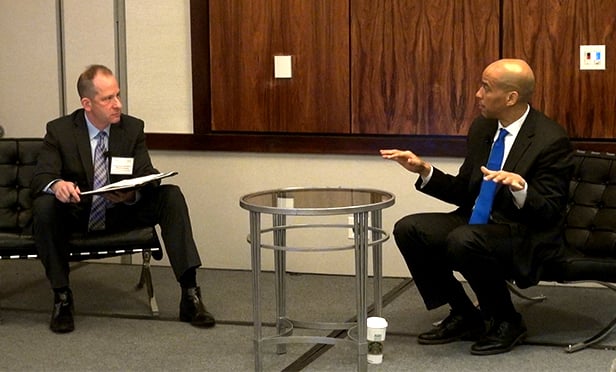 Christopher Coes, vice president of land use and development, Smart Growth America.
Christopher Coes, vice president of land use and development, Smart Growth America.
NEW BRUNSWICK, NJ—Investors taking advantage of new federal opportunity zone tax rules may get an additional federal benefit in coming weeks through a planned executive order from the Trump Administration, according to one of the panelists at today's Rutgers Center for Real Estate program on the opportunity zone programs.
President Trump is planning to sign an executive order giving opportunity zone investments additional preferences in federal loan and grant funding, says Christopher Coes, vice president of land use and development, Smart Growth America.
But it's not clear that such an order is under active discussion.
Molly Millerwise Meiners, principal deputy assistant secretary for public affairs at the Treasury Department, referred a GlobeSt.com inquiry to the White House, which did not respond to a request for clarification by late Monday night.
New Jersey Senator Cory Booker, one of the authors of the legislation, wants the benefits of the Opportunity Zone program shared broadly. He argues that the current federal tax code creates the wrong incentives by rewarding certain occupations with generous tax benefits while penalizing others that could use additional tax relief because of their importance to the nation.
 NJ Sen. Cory Booker, right, makes a point during conversation with Morris A. Davis, Paul V. Profeta Chair of Real Estate, and Academic Director, Rutgers Center for Real Estate, at Opportunity Zones Conference in New Brunswick, NJ
NJ Sen. Cory Booker, right, makes a point during conversation with Morris A. Davis, Paul V. Profeta Chair of Real Estate, and Academic Director, Rutgers Center for Real Estate, at Opportunity Zones Conference in New Brunswick, NJ“I want to create a business case for low income areas, for investing everywhere from rural south Alabama all the way to Englewood, NJ,” he says. “I think we have the most perverse incentives in our tax code, that we don't incent by the outcomes that we claim we really want. It is ridiculous to me that we live in a nation where there's no way that teaching profession will ever be valued for the economic contributions that it makes to our nation.”
Booker compared a 25-year-old-friend who, as a stockbroker, makes more than $500,000 annually, while a 55-year-old teacher honored as a teacher of the year is still paying off student debt.
“Why does one of my friends get carried interest (deductions) and all of that, and the teacher can't even get a tax break to refinance his student loans?” Booker asked.
Nevertheless, panelists at the conference confirmed that the Opportunity Zones legislation offers attractive alternatives for investors with capital gains in other assets. Under the regulations, appreciated assets can be sold and taxes on the capital gains deferred for up to ten years if the proceeds are invested in real estate in a designated Opportunity Zone.
“In my mind, it's one of the most impactful legislations for the real estate industry for the last 50 years,” says Anthony Rinaldi, founder and managing principal of Saxum Real Estate. ”The opportunity for investors to defer taxes, reduce taxes, ultimately eliminate gains, is unprecedented.”
There is a lot of capital starting to flow into opportunity zone investments, Rinaldi says. “Finding the right risk adjusted returns is going to be probably the biggest job.”
“It's an amazing opportunity for the city of Newark,” says Jason C. Grove, chief policy advisor in the city of Newark. “It's an opportunity for us to continue on as a part of a strategy to create affordable housing, businesses, and really change the landscape of our neighborhoods.”
© Touchpoint Markets, All Rights Reserved. Request academic re-use from www.copyright.com. All other uses, submit a request to [email protected]. For more inforrmation visit Asset & Logo Licensing.







